Comprehensive Analysis of Business Law: Legal Framework and Practices
VerifiedAdded on 2024/05/21
|27
|5401
|276
Report
AI Summary
This report provides a comprehensive overview of key aspects of business law. It begins by analyzing the legal rules of implied terms in the sale of goods and supply of services, statutory provisions on the transfer of property and possession, and remedies for buyers and sellers in sale of goods contracts. It also examines product liability legal rules and statutory provisions for faulty goods. The report then differentiates between types of credit agreements, analyzes legal rules on termination rights and default notices, and explores the features of agency, including the rights and duties of an agent. Furthermore, it outlines monopolies and anti-competitive practice legislation in the UK, explains the role of the Competition Commission and the UK Office of Fair Trading, defines dominant positions within the EU common market, and discusses exemptions to anti-competitive practices under EU law. Finally, the report identifies and explains different forms of intellectual property rights, outlines principles for protecting inventions through patent rights, describes copyright protection principles, and compares the protection of trademarks and business names. This detailed analysis is intended to provide a thorough understanding of the legal landscape affecting businesses.
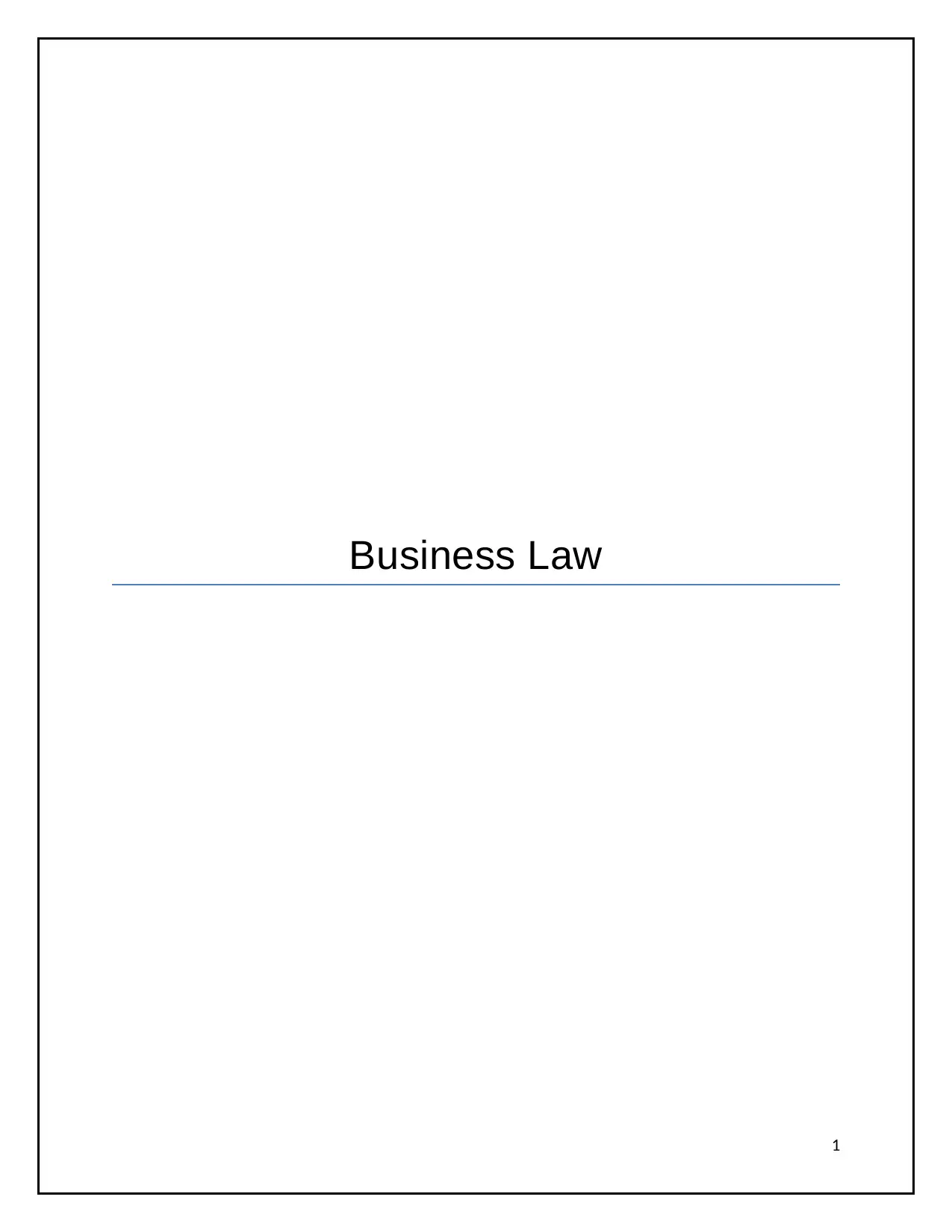
Business Law
1
1
Paraphrase This Document
Need a fresh take? Get an instant paraphrase of this document with our AI Paraphraser
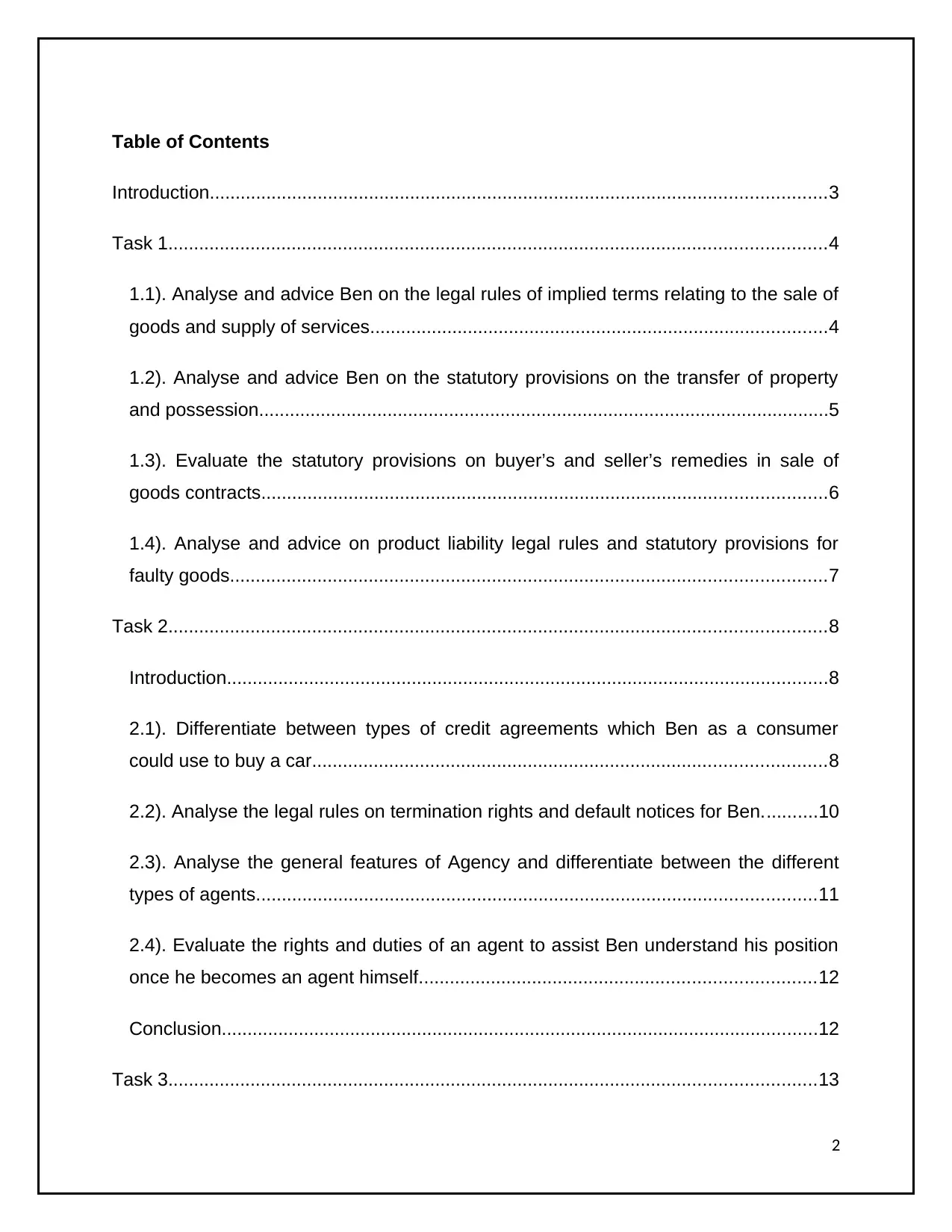
Table of Contents
Introduction........................................................................................................................3
Task 1................................................................................................................................4
1.1). Analyse and advice Ben on the legal rules of implied terms relating to the sale of
goods and supply of services.........................................................................................4
1.2). Analyse and advice Ben on the statutory provisions on the transfer of property
and possession...............................................................................................................5
1.3). Evaluate the statutory provisions on buyer’s and seller’s remedies in sale of
goods contracts..............................................................................................................6
1.4). Analyse and advice on product liability legal rules and statutory provisions for
faulty goods....................................................................................................................7
Task 2................................................................................................................................8
Introduction.....................................................................................................................8
2.1). Differentiate between types of credit agreements which Ben as a consumer
could use to buy a car....................................................................................................8
2.2). Analyse the legal rules on termination rights and default notices for Ben...........10
2.3). Analyse the general features of Agency and differentiate between the different
types of agents.............................................................................................................11
2.4). Evaluate the rights and duties of an agent to assist Ben understand his position
once he becomes an agent himself.............................................................................12
Conclusion....................................................................................................................12
Task 3..............................................................................................................................13
2
Introduction........................................................................................................................3
Task 1................................................................................................................................4
1.1). Analyse and advice Ben on the legal rules of implied terms relating to the sale of
goods and supply of services.........................................................................................4
1.2). Analyse and advice Ben on the statutory provisions on the transfer of property
and possession...............................................................................................................5
1.3). Evaluate the statutory provisions on buyer’s and seller’s remedies in sale of
goods contracts..............................................................................................................6
1.4). Analyse and advice on product liability legal rules and statutory provisions for
faulty goods....................................................................................................................7
Task 2................................................................................................................................8
Introduction.....................................................................................................................8
2.1). Differentiate between types of credit agreements which Ben as a consumer
could use to buy a car....................................................................................................8
2.2). Analyse the legal rules on termination rights and default notices for Ben...........10
2.3). Analyse the general features of Agency and differentiate between the different
types of agents.............................................................................................................11
2.4). Evaluate the rights and duties of an agent to assist Ben understand his position
once he becomes an agent himself.............................................................................12
Conclusion....................................................................................................................12
Task 3..............................................................................................................................13
2
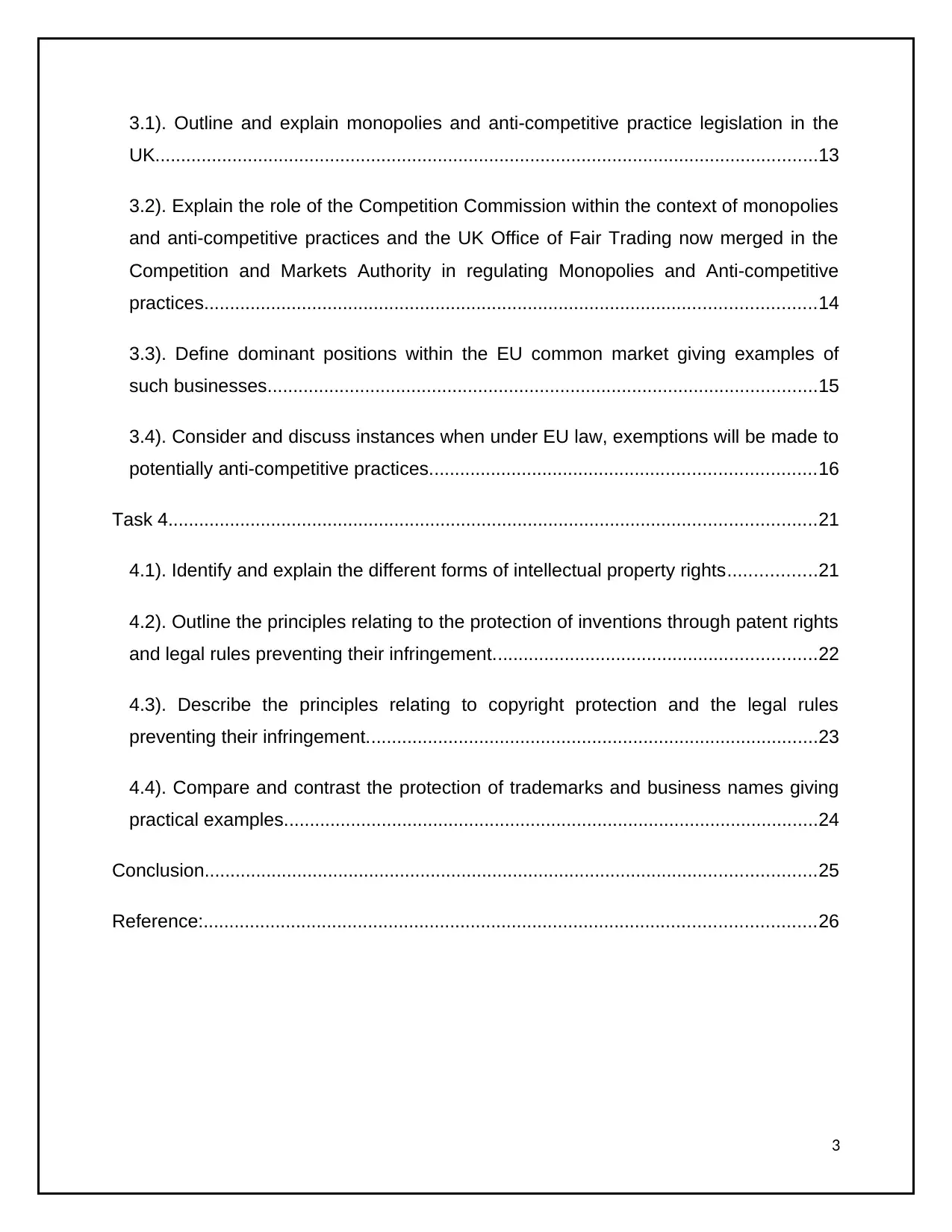
3.1). Outline and explain monopolies and anti-competitive practice legislation in the
UK.................................................................................................................................13
3.2). Explain the role of the Competition Commission within the context of monopolies
and anti-competitive practices and the UK Office of Fair Trading now merged in the
Competition and Markets Authority in regulating Monopolies and Anti-competitive
practices.......................................................................................................................14
3.3). Define dominant positions within the EU common market giving examples of
such businesses...........................................................................................................15
3.4). Consider and discuss instances when under EU law, exemptions will be made to
potentially anti-competitive practices...........................................................................16
Task 4..............................................................................................................................21
4.1). Identify and explain the different forms of intellectual property rights.................21
4.2). Outline the principles relating to the protection of inventions through patent rights
and legal rules preventing their infringement...............................................................22
4.3). Describe the principles relating to copyright protection and the legal rules
preventing their infringement........................................................................................23
4.4). Compare and contrast the protection of trademarks and business names giving
practical examples........................................................................................................24
Conclusion.......................................................................................................................25
Reference:.......................................................................................................................26
3
UK.................................................................................................................................13
3.2). Explain the role of the Competition Commission within the context of monopolies
and anti-competitive practices and the UK Office of Fair Trading now merged in the
Competition and Markets Authority in regulating Monopolies and Anti-competitive
practices.......................................................................................................................14
3.3). Define dominant positions within the EU common market giving examples of
such businesses...........................................................................................................15
3.4). Consider and discuss instances when under EU law, exemptions will be made to
potentially anti-competitive practices...........................................................................16
Task 4..............................................................................................................................21
4.1). Identify and explain the different forms of intellectual property rights.................21
4.2). Outline the principles relating to the protection of inventions through patent rights
and legal rules preventing their infringement...............................................................22
4.3). Describe the principles relating to copyright protection and the legal rules
preventing their infringement........................................................................................23
4.4). Compare and contrast the protection of trademarks and business names giving
practical examples........................................................................................................24
Conclusion.......................................................................................................................25
Reference:.......................................................................................................................26
3
⊘ This is a preview!⊘
Do you want full access?
Subscribe today to unlock all pages.

Trusted by 1+ million students worldwide
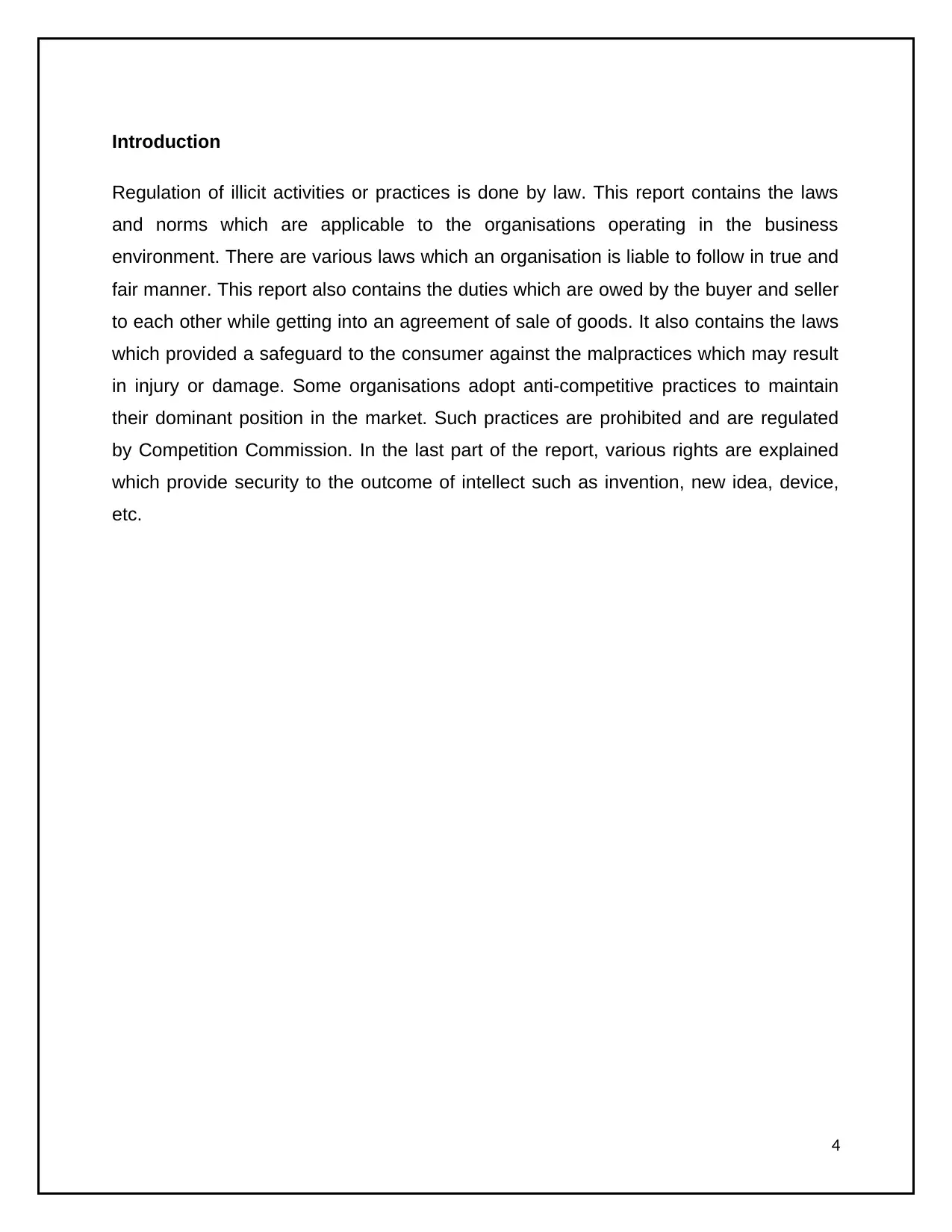
Introduction
Regulation of illicit activities or practices is done by law. This report contains the laws
and norms which are applicable to the organisations operating in the business
environment. There are various laws which an organisation is liable to follow in true and
fair manner. This report also contains the duties which are owed by the buyer and seller
to each other while getting into an agreement of sale of goods. It also contains the laws
which provided a safeguard to the consumer against the malpractices which may result
in injury or damage. Some organisations adopt anti-competitive practices to maintain
their dominant position in the market. Such practices are prohibited and are regulated
by Competition Commission. In the last part of the report, various rights are explained
which provide security to the outcome of intellect such as invention, new idea, device,
etc.
4
Regulation of illicit activities or practices is done by law. This report contains the laws
and norms which are applicable to the organisations operating in the business
environment. There are various laws which an organisation is liable to follow in true and
fair manner. This report also contains the duties which are owed by the buyer and seller
to each other while getting into an agreement of sale of goods. It also contains the laws
which provided a safeguard to the consumer against the malpractices which may result
in injury or damage. Some organisations adopt anti-competitive practices to maintain
their dominant position in the market. Such practices are prohibited and are regulated
by Competition Commission. In the last part of the report, various rights are explained
which provide security to the outcome of intellect such as invention, new idea, device,
etc.
4
Paraphrase This Document
Need a fresh take? Get an instant paraphrase of this document with our AI Paraphraser
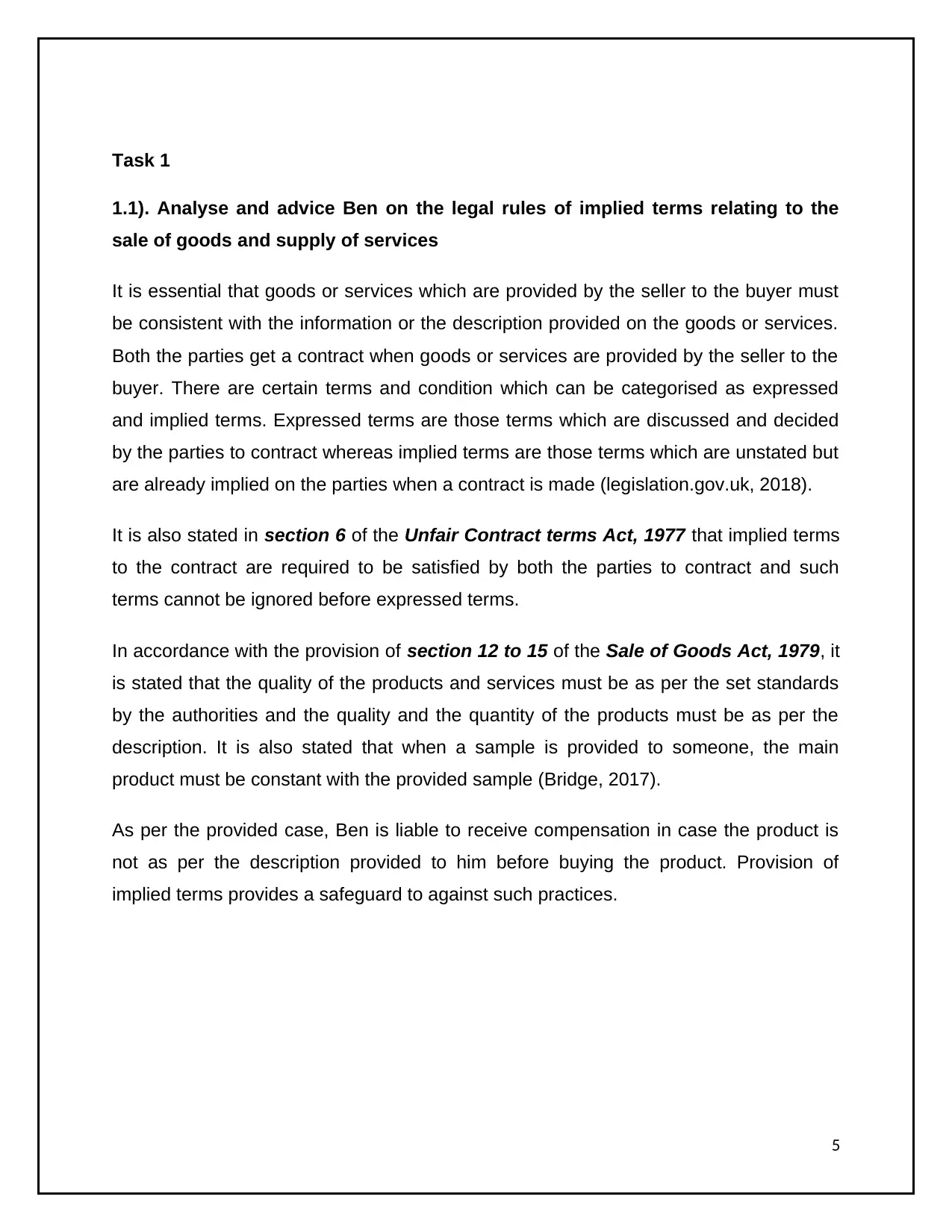
Task 1
1.1). Analyse and advice Ben on the legal rules of implied terms relating to the
sale of goods and supply of services
It is essential that goods or services which are provided by the seller to the buyer must
be consistent with the information or the description provided on the goods or services.
Both the parties get a contract when goods or services are provided by the seller to the
buyer. There are certain terms and condition which can be categorised as expressed
and implied terms. Expressed terms are those terms which are discussed and decided
by the parties to contract whereas implied terms are those terms which are unstated but
are already implied on the parties when a contract is made (legislation.gov.uk, 2018).
It is also stated in section 6 of the Unfair Contract terms Act, 1977 that implied terms
to the contract are required to be satisfied by both the parties to contract and such
terms cannot be ignored before expressed terms.
In accordance with the provision of section 12 to 15 of the Sale of Goods Act, 1979, it
is stated that the quality of the products and services must be as per the set standards
by the authorities and the quality and the quantity of the products must be as per the
description. It is also stated that when a sample is provided to someone, the main
product must be constant with the provided sample (Bridge, 2017).
As per the provided case, Ben is liable to receive compensation in case the product is
not as per the description provided to him before buying the product. Provision of
implied terms provides a safeguard to against such practices.
5
1.1). Analyse and advice Ben on the legal rules of implied terms relating to the
sale of goods and supply of services
It is essential that goods or services which are provided by the seller to the buyer must
be consistent with the information or the description provided on the goods or services.
Both the parties get a contract when goods or services are provided by the seller to the
buyer. There are certain terms and condition which can be categorised as expressed
and implied terms. Expressed terms are those terms which are discussed and decided
by the parties to contract whereas implied terms are those terms which are unstated but
are already implied on the parties when a contract is made (legislation.gov.uk, 2018).
It is also stated in section 6 of the Unfair Contract terms Act, 1977 that implied terms
to the contract are required to be satisfied by both the parties to contract and such
terms cannot be ignored before expressed terms.
In accordance with the provision of section 12 to 15 of the Sale of Goods Act, 1979, it
is stated that the quality of the products and services must be as per the set standards
by the authorities and the quality and the quantity of the products must be as per the
description. It is also stated that when a sample is provided to someone, the main
product must be constant with the provided sample (Bridge, 2017).
As per the provided case, Ben is liable to receive compensation in case the product is
not as per the description provided to him before buying the product. Provision of
implied terms provides a safeguard to against such practices.
5
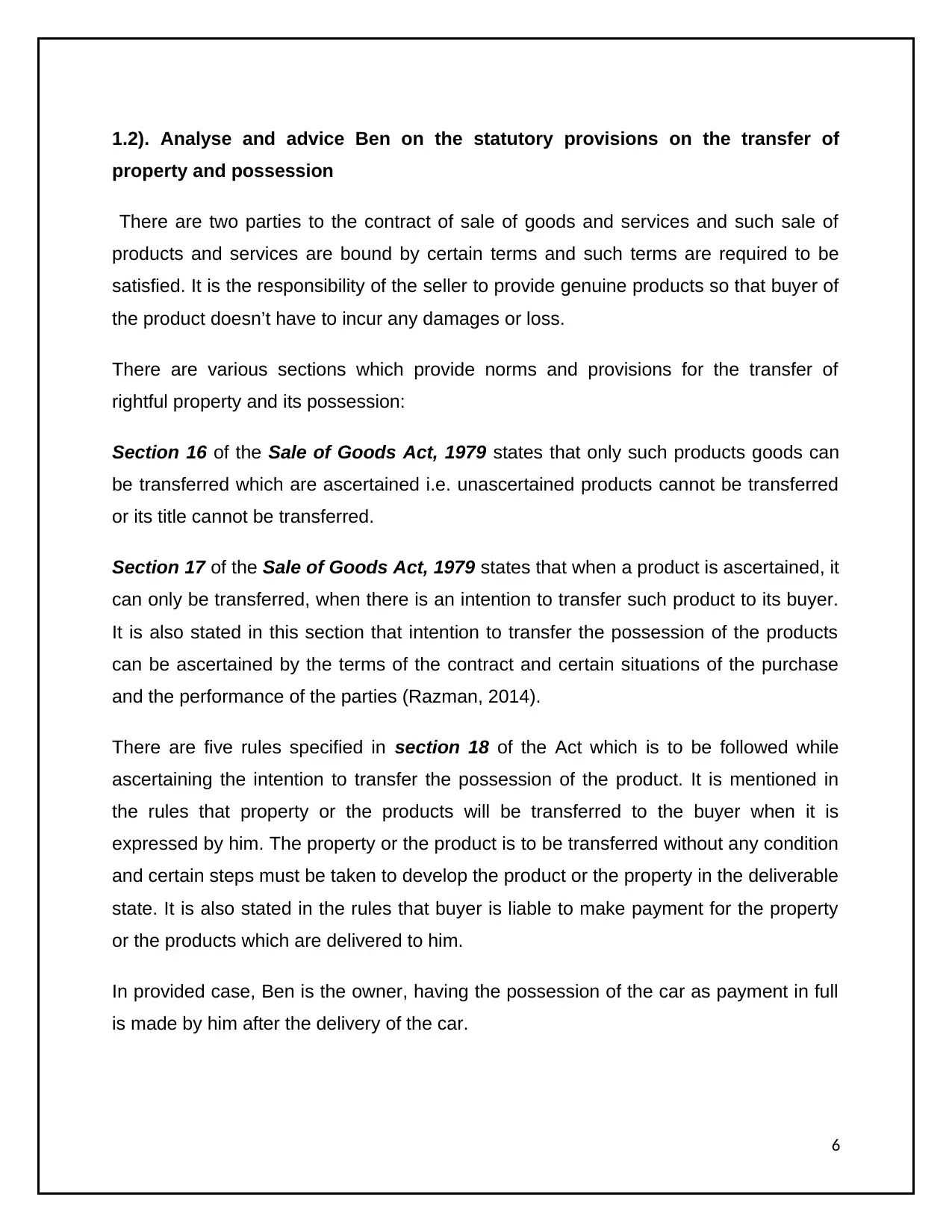
1.2). Analyse and advice Ben on the statutory provisions on the transfer of
property and possession
There are two parties to the contract of sale of goods and services and such sale of
products and services are bound by certain terms and such terms are required to be
satisfied. It is the responsibility of the seller to provide genuine products so that buyer of
the product doesn’t have to incur any damages or loss.
There are various sections which provide norms and provisions for the transfer of
rightful property and its possession:
Section 16 of the Sale of Goods Act, 1979 states that only such products goods can
be transferred which are ascertained i.e. unascertained products cannot be transferred
or its title cannot be transferred.
Section 17 of the Sale of Goods Act, 1979 states that when a product is ascertained, it
can only be transferred, when there is an intention to transfer such product to its buyer.
It is also stated in this section that intention to transfer the possession of the products
can be ascertained by the terms of the contract and certain situations of the purchase
and the performance of the parties (Razman, 2014).
There are five rules specified in section 18 of the Act which is to be followed while
ascertaining the intention to transfer the possession of the product. It is mentioned in
the rules that property or the products will be transferred to the buyer when it is
expressed by him. The property or the product is to be transferred without any condition
and certain steps must be taken to develop the product or the property in the deliverable
state. It is also stated in the rules that buyer is liable to make payment for the property
or the products which are delivered to him.
In provided case, Ben is the owner, having the possession of the car as payment in full
is made by him after the delivery of the car.
6
property and possession
There are two parties to the contract of sale of goods and services and such sale of
products and services are bound by certain terms and such terms are required to be
satisfied. It is the responsibility of the seller to provide genuine products so that buyer of
the product doesn’t have to incur any damages or loss.
There are various sections which provide norms and provisions for the transfer of
rightful property and its possession:
Section 16 of the Sale of Goods Act, 1979 states that only such products goods can
be transferred which are ascertained i.e. unascertained products cannot be transferred
or its title cannot be transferred.
Section 17 of the Sale of Goods Act, 1979 states that when a product is ascertained, it
can only be transferred, when there is an intention to transfer such product to its buyer.
It is also stated in this section that intention to transfer the possession of the products
can be ascertained by the terms of the contract and certain situations of the purchase
and the performance of the parties (Razman, 2014).
There are five rules specified in section 18 of the Act which is to be followed while
ascertaining the intention to transfer the possession of the product. It is mentioned in
the rules that property or the products will be transferred to the buyer when it is
expressed by him. The property or the product is to be transferred without any condition
and certain steps must be taken to develop the product or the property in the deliverable
state. It is also stated in the rules that buyer is liable to make payment for the property
or the products which are delivered to him.
In provided case, Ben is the owner, having the possession of the car as payment in full
is made by him after the delivery of the car.
6
⊘ This is a preview!⊘
Do you want full access?
Subscribe today to unlock all pages.

Trusted by 1+ million students worldwide
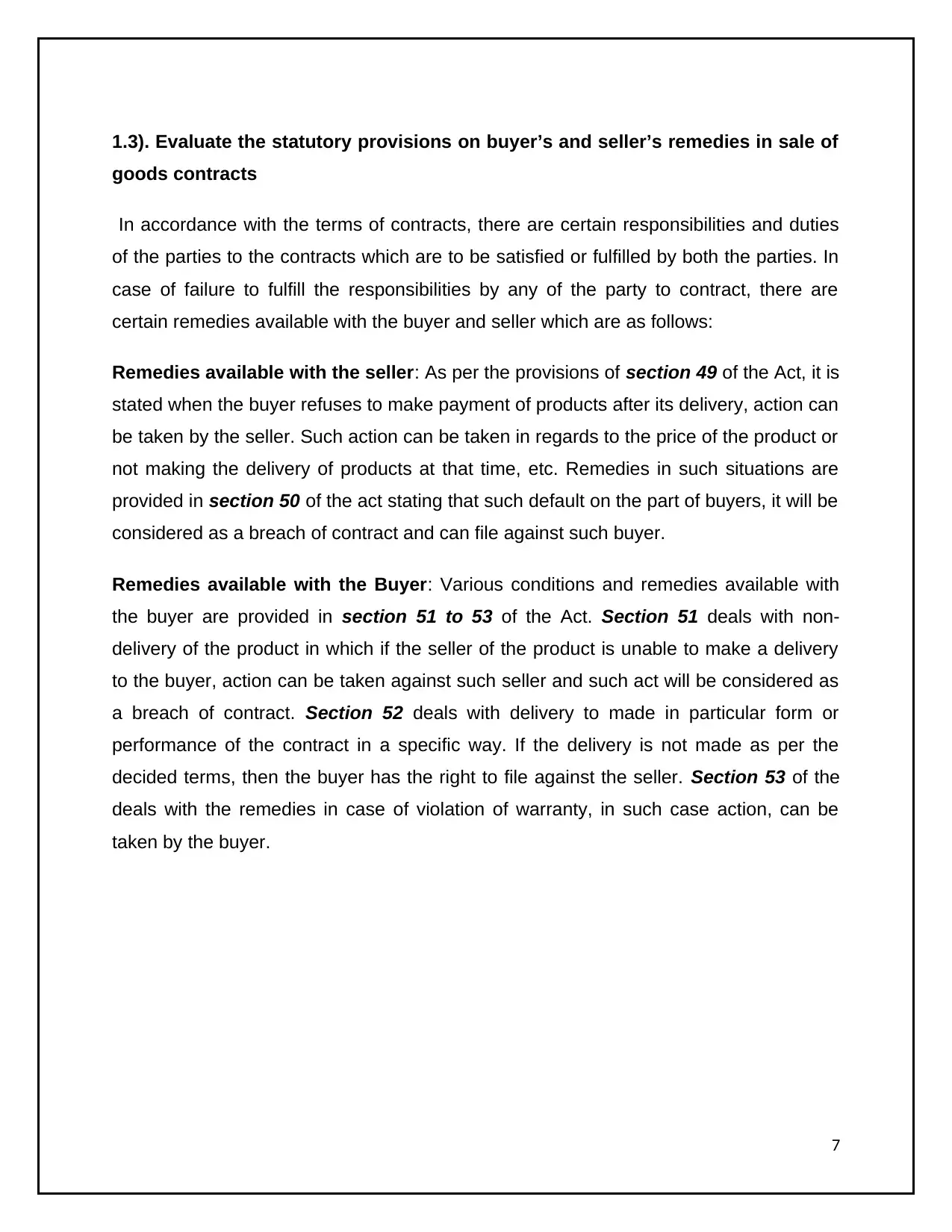
1.3). Evaluate the statutory provisions on buyer’s and seller’s remedies in sale of
goods contracts
In accordance with the terms of contracts, there are certain responsibilities and duties
of the parties to the contracts which are to be satisfied or fulfilled by both the parties. In
case of failure to fulfill the responsibilities by any of the party to contract, there are
certain remedies available with the buyer and seller which are as follows:
Remedies available with the seller: As per the provisions of section 49 of the Act, it is
stated when the buyer refuses to make payment of products after its delivery, action can
be taken by the seller. Such action can be taken in regards to the price of the product or
not making the delivery of products at that time, etc. Remedies in such situations are
provided in section 50 of the act stating that such default on the part of buyers, it will be
considered as a breach of contract and can file against such buyer.
Remedies available with the Buyer: Various conditions and remedies available with
the buyer are provided in section 51 to 53 of the Act. Section 51 deals with non-
delivery of the product in which if the seller of the product is unable to make a delivery
to the buyer, action can be taken against such seller and such act will be considered as
a breach of contract. Section 52 deals with delivery to made in particular form or
performance of the contract in a specific way. If the delivery is not made as per the
decided terms, then the buyer has the right to file against the seller. Section 53 of the
deals with the remedies in case of violation of warranty, in such case action, can be
taken by the buyer.
7
goods contracts
In accordance with the terms of contracts, there are certain responsibilities and duties
of the parties to the contracts which are to be satisfied or fulfilled by both the parties. In
case of failure to fulfill the responsibilities by any of the party to contract, there are
certain remedies available with the buyer and seller which are as follows:
Remedies available with the seller: As per the provisions of section 49 of the Act, it is
stated when the buyer refuses to make payment of products after its delivery, action can
be taken by the seller. Such action can be taken in regards to the price of the product or
not making the delivery of products at that time, etc. Remedies in such situations are
provided in section 50 of the act stating that such default on the part of buyers, it will be
considered as a breach of contract and can file against such buyer.
Remedies available with the Buyer: Various conditions and remedies available with
the buyer are provided in section 51 to 53 of the Act. Section 51 deals with non-
delivery of the product in which if the seller of the product is unable to make a delivery
to the buyer, action can be taken against such seller and such act will be considered as
a breach of contract. Section 52 deals with delivery to made in particular form or
performance of the contract in a specific way. If the delivery is not made as per the
decided terms, then the buyer has the right to file against the seller. Section 53 of the
deals with the remedies in case of violation of warranty, in such case action, can be
taken by the buyer.
7
Paraphrase This Document
Need a fresh take? Get an instant paraphrase of this document with our AI Paraphraser
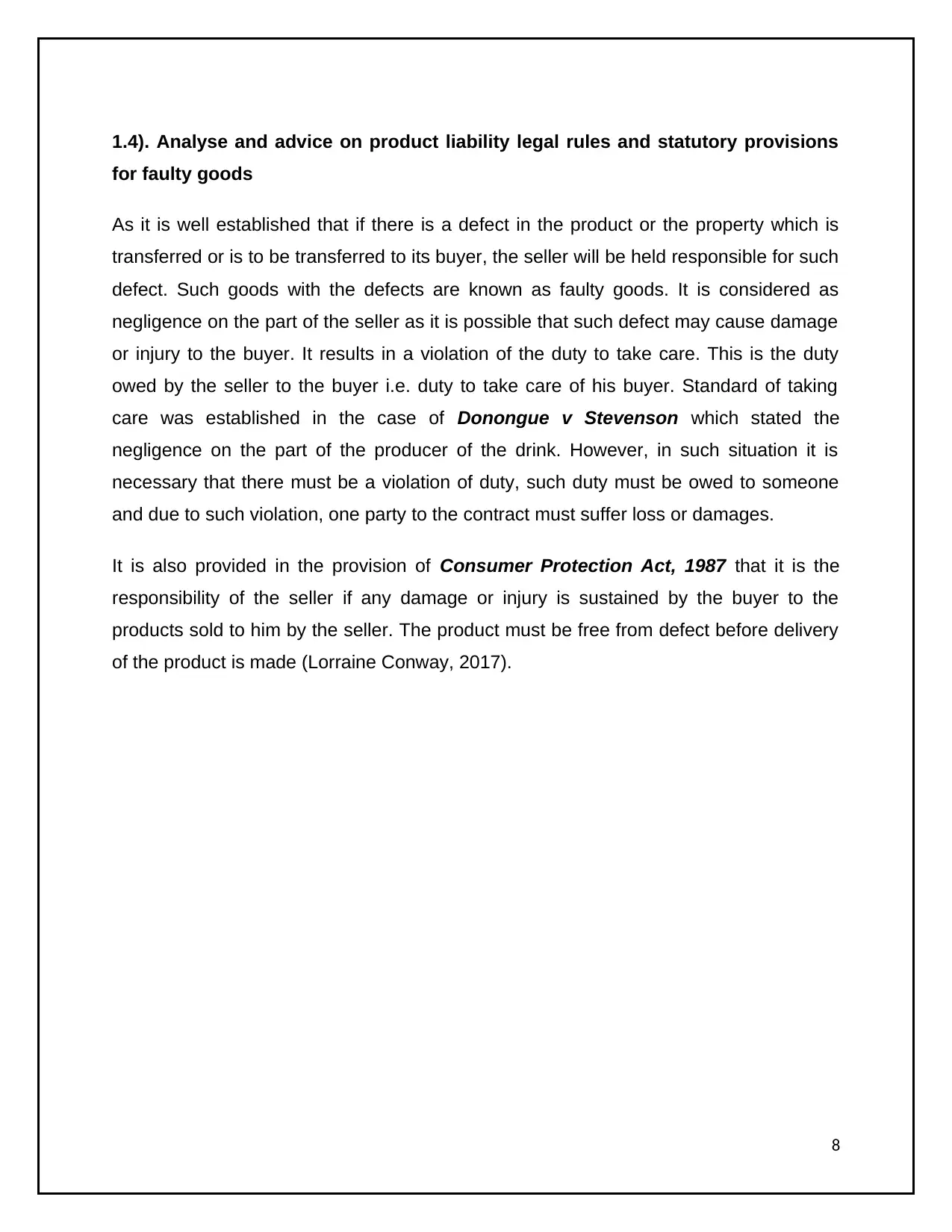
1.4). Analyse and advice on product liability legal rules and statutory provisions
for faulty goods
As it is well established that if there is a defect in the product or the property which is
transferred or is to be transferred to its buyer, the seller will be held responsible for such
defect. Such goods with the defects are known as faulty goods. It is considered as
negligence on the part of the seller as it is possible that such defect may cause damage
or injury to the buyer. It results in a violation of the duty to take care. This is the duty
owed by the seller to the buyer i.e. duty to take care of his buyer. Standard of taking
care was established in the case of Donongue v Stevenson which stated the
negligence on the part of the producer of the drink. However, in such situation it is
necessary that there must be a violation of duty, such duty must be owed to someone
and due to such violation, one party to the contract must suffer loss or damages.
It is also provided in the provision of Consumer Protection Act, 1987 that it is the
responsibility of the seller if any damage or injury is sustained by the buyer to the
products sold to him by the seller. The product must be free from defect before delivery
of the product is made (Lorraine Conway, 2017).
8
for faulty goods
As it is well established that if there is a defect in the product or the property which is
transferred or is to be transferred to its buyer, the seller will be held responsible for such
defect. Such goods with the defects are known as faulty goods. It is considered as
negligence on the part of the seller as it is possible that such defect may cause damage
or injury to the buyer. It results in a violation of the duty to take care. This is the duty
owed by the seller to the buyer i.e. duty to take care of his buyer. Standard of taking
care was established in the case of Donongue v Stevenson which stated the
negligence on the part of the producer of the drink. However, in such situation it is
necessary that there must be a violation of duty, such duty must be owed to someone
and due to such violation, one party to the contract must suffer loss or damages.
It is also provided in the provision of Consumer Protection Act, 1987 that it is the
responsibility of the seller if any damage or injury is sustained by the buyer to the
products sold to him by the seller. The product must be free from defect before delivery
of the product is made (Lorraine Conway, 2017).
8
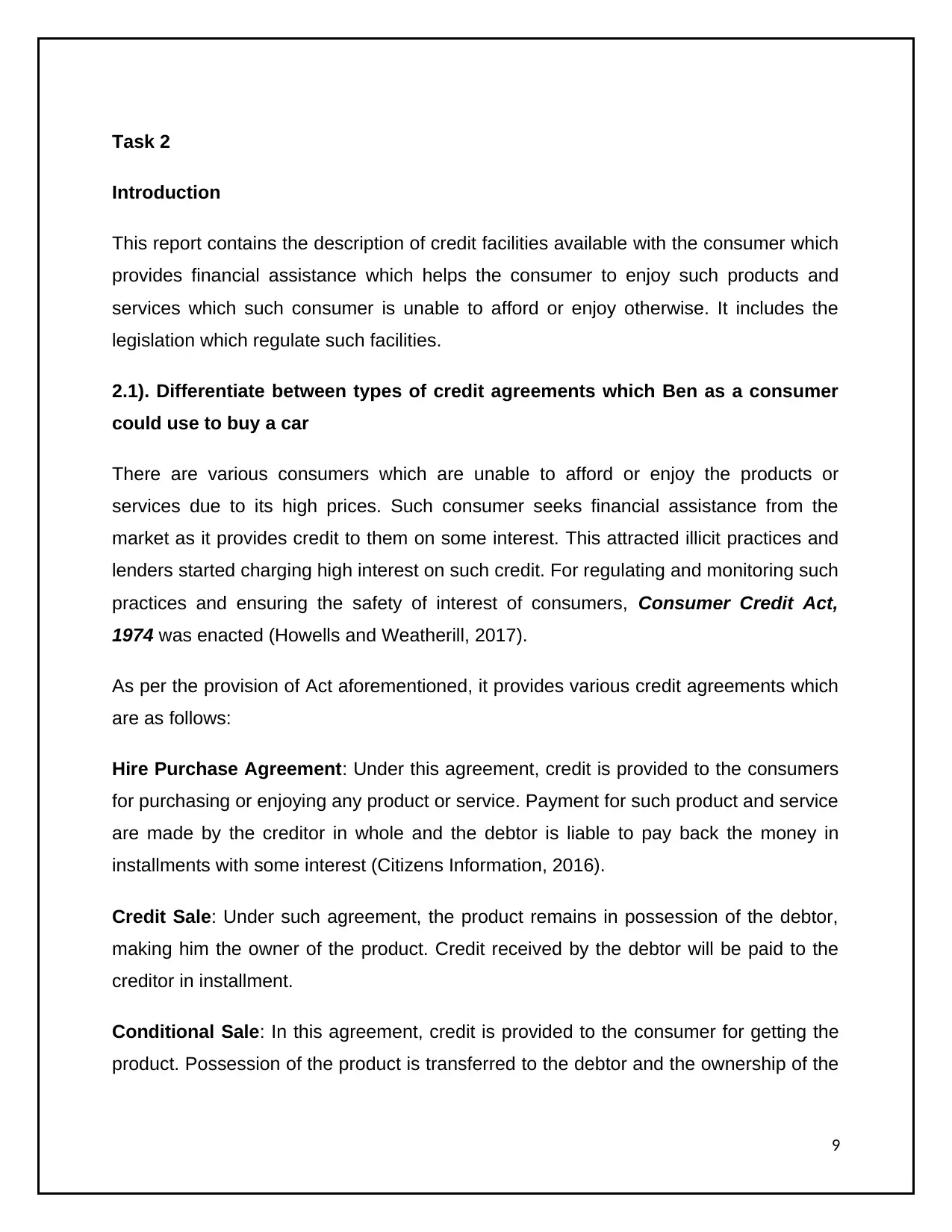
Task 2
Introduction
This report contains the description of credit facilities available with the consumer which
provides financial assistance which helps the consumer to enjoy such products and
services which such consumer is unable to afford or enjoy otherwise. It includes the
legislation which regulate such facilities.
2.1). Differentiate between types of credit agreements which Ben as a consumer
could use to buy a car
There are various consumers which are unable to afford or enjoy the products or
services due to its high prices. Such consumer seeks financial assistance from the
market as it provides credit to them on some interest. This attracted illicit practices and
lenders started charging high interest on such credit. For regulating and monitoring such
practices and ensuring the safety of interest of consumers, Consumer Credit Act,
1974 was enacted (Howells and Weatherill, 2017).
As per the provision of Act aforementioned, it provides various credit agreements which
are as follows:
Hire Purchase Agreement: Under this agreement, credit is provided to the consumers
for purchasing or enjoying any product or service. Payment for such product and service
are made by the creditor in whole and the debtor is liable to pay back the money in
installments with some interest (Citizens Information, 2016).
Credit Sale: Under such agreement, the product remains in possession of the debtor,
making him the owner of the product. Credit received by the debtor will be paid to the
creditor in installment.
Conditional Sale: In this agreement, credit is provided to the consumer for getting the
product. Possession of the product is transferred to the debtor and the ownership of the
9
Introduction
This report contains the description of credit facilities available with the consumer which
provides financial assistance which helps the consumer to enjoy such products and
services which such consumer is unable to afford or enjoy otherwise. It includes the
legislation which regulate such facilities.
2.1). Differentiate between types of credit agreements which Ben as a consumer
could use to buy a car
There are various consumers which are unable to afford or enjoy the products or
services due to its high prices. Such consumer seeks financial assistance from the
market as it provides credit to them on some interest. This attracted illicit practices and
lenders started charging high interest on such credit. For regulating and monitoring such
practices and ensuring the safety of interest of consumers, Consumer Credit Act,
1974 was enacted (Howells and Weatherill, 2017).
As per the provision of Act aforementioned, it provides various credit agreements which
are as follows:
Hire Purchase Agreement: Under this agreement, credit is provided to the consumers
for purchasing or enjoying any product or service. Payment for such product and service
are made by the creditor in whole and the debtor is liable to pay back the money in
installments with some interest (Citizens Information, 2016).
Credit Sale: Under such agreement, the product remains in possession of the debtor,
making him the owner of the product. Credit received by the debtor will be paid to the
creditor in installment.
Conditional Sale: In this agreement, credit is provided to the consumer for getting the
product. Possession of the product is transferred to the debtor and the ownership of the
9
⊘ This is a preview!⊘
Do you want full access?
Subscribe today to unlock all pages.

Trusted by 1+ million students worldwide
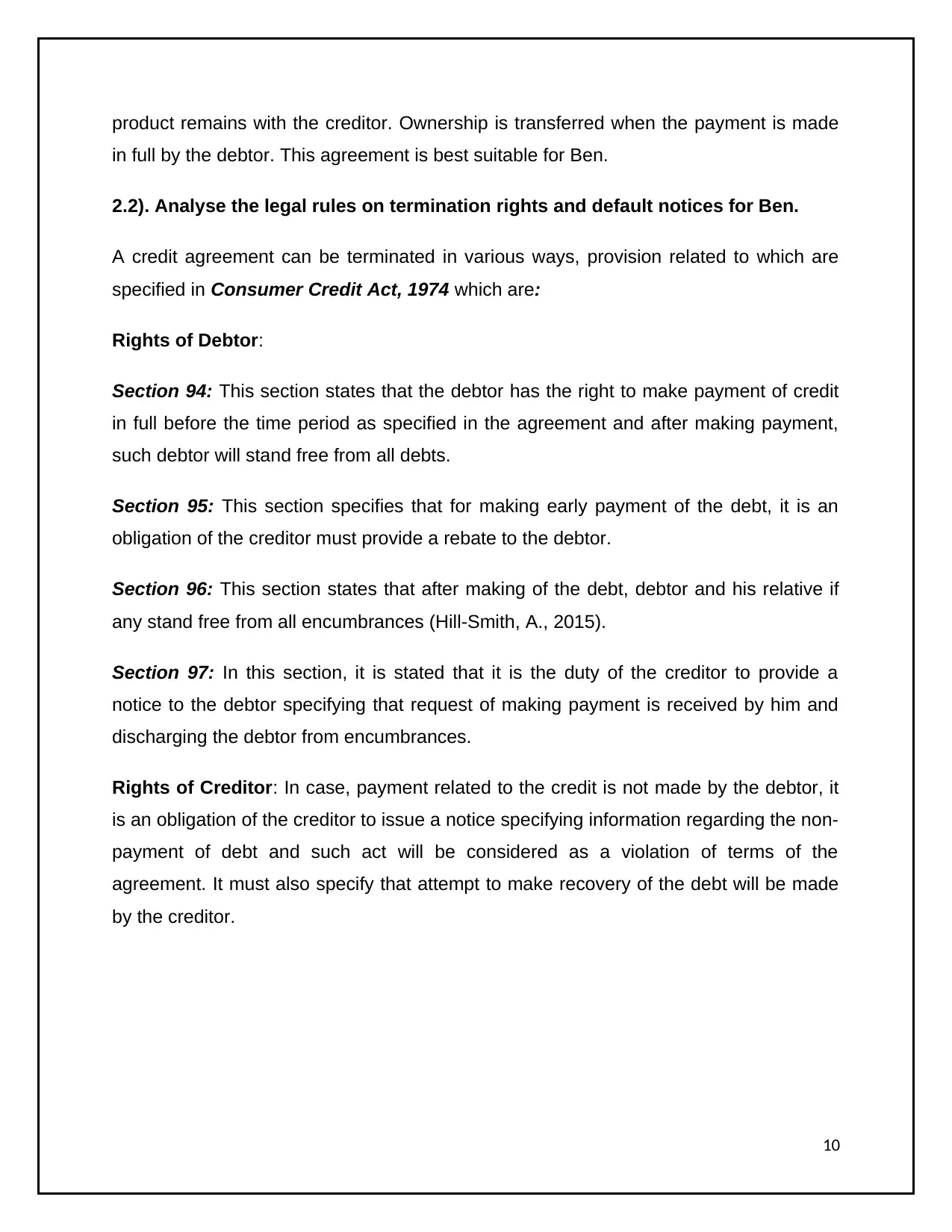
product remains with the creditor. Ownership is transferred when the payment is made
in full by the debtor. This agreement is best suitable for Ben.
2.2). Analyse the legal rules on termination rights and default notices for Ben.
A credit agreement can be terminated in various ways, provision related to which are
specified in Consumer Credit Act, 1974 which are:
Rights of Debtor:
Section 94: This section states that the debtor has the right to make payment of credit
in full before the time period as specified in the agreement and after making payment,
such debtor will stand free from all debts.
Section 95: This section specifies that for making early payment of the debt, it is an
obligation of the creditor must provide a rebate to the debtor.
Section 96: This section states that after making of the debt, debtor and his relative if
any stand free from all encumbrances (Hill-Smith, A., 2015).
Section 97: In this section, it is stated that it is the duty of the creditor to provide a
notice to the debtor specifying that request of making payment is received by him and
discharging the debtor from encumbrances.
Rights of Creditor: In case, payment related to the credit is not made by the debtor, it
is an obligation of the creditor to issue a notice specifying information regarding the non-
payment of debt and such act will be considered as a violation of terms of the
agreement. It must also specify that attempt to make recovery of the debt will be made
by the creditor.
10
in full by the debtor. This agreement is best suitable for Ben.
2.2). Analyse the legal rules on termination rights and default notices for Ben.
A credit agreement can be terminated in various ways, provision related to which are
specified in Consumer Credit Act, 1974 which are:
Rights of Debtor:
Section 94: This section states that the debtor has the right to make payment of credit
in full before the time period as specified in the agreement and after making payment,
such debtor will stand free from all debts.
Section 95: This section specifies that for making early payment of the debt, it is an
obligation of the creditor must provide a rebate to the debtor.
Section 96: This section states that after making of the debt, debtor and his relative if
any stand free from all encumbrances (Hill-Smith, A., 2015).
Section 97: In this section, it is stated that it is the duty of the creditor to provide a
notice to the debtor specifying that request of making payment is received by him and
discharging the debtor from encumbrances.
Rights of Creditor: In case, payment related to the credit is not made by the debtor, it
is an obligation of the creditor to issue a notice specifying information regarding the non-
payment of debt and such act will be considered as a violation of terms of the
agreement. It must also specify that attempt to make recovery of the debt will be made
by the creditor.
10
Paraphrase This Document
Need a fresh take? Get an instant paraphrase of this document with our AI Paraphraser
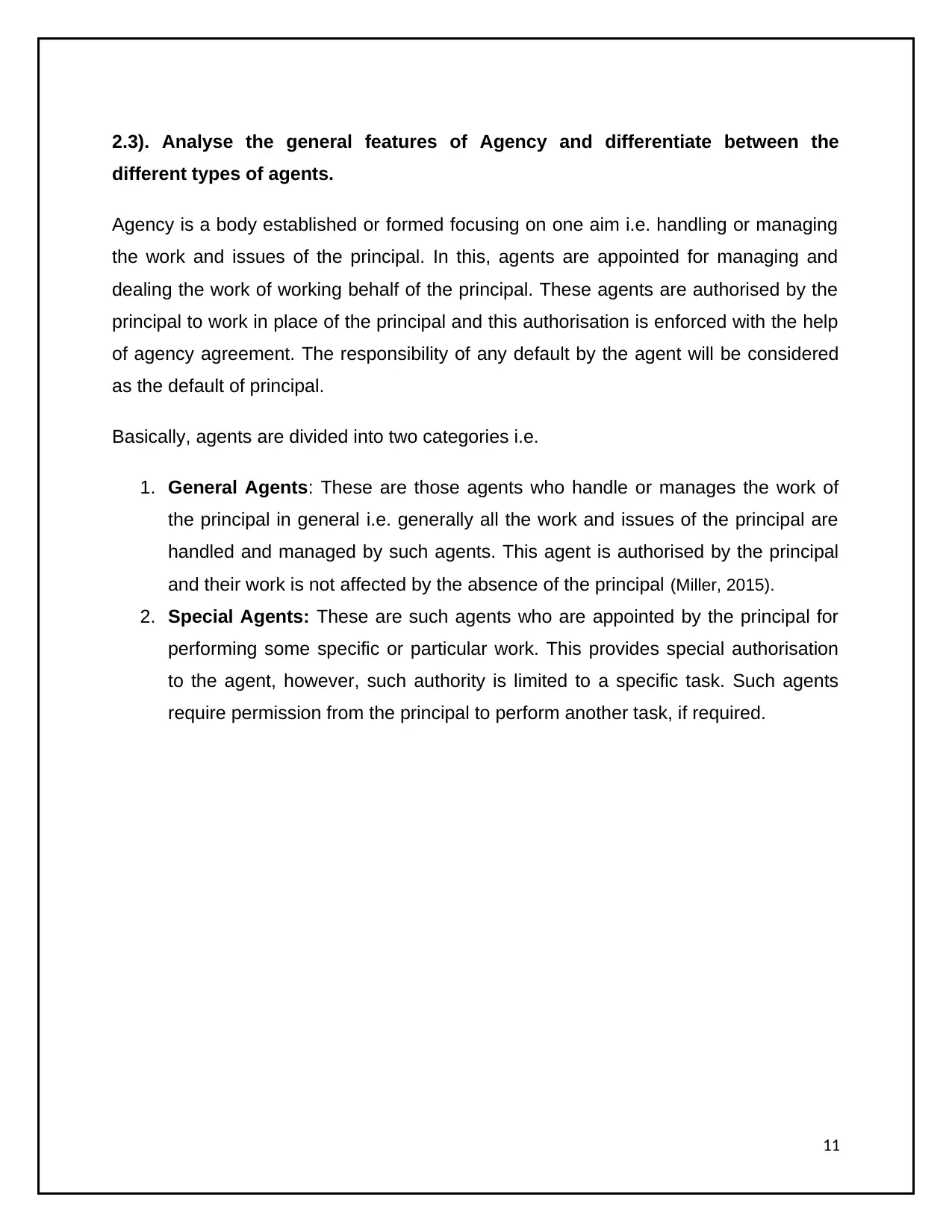
2.3). Analyse the general features of Agency and differentiate between the
different types of agents.
Agency is a body established or formed focusing on one aim i.e. handling or managing
the work and issues of the principal. In this, agents are appointed for managing and
dealing the work of working behalf of the principal. These agents are authorised by the
principal to work in place of the principal and this authorisation is enforced with the help
of agency agreement. The responsibility of any default by the agent will be considered
as the default of principal.
Basically, agents are divided into two categories i.e.
1. General Agents: These are those agents who handle or manages the work of
the principal in general i.e. generally all the work and issues of the principal are
handled and managed by such agents. This agent is authorised by the principal
and their work is not affected by the absence of the principal (Miller, 2015).
2. Special Agents: These are such agents who are appointed by the principal for
performing some specific or particular work. This provides special authorisation
to the agent, however, such authority is limited to a specific task. Such agents
require permission from the principal to perform another task, if required.
11
different types of agents.
Agency is a body established or formed focusing on one aim i.e. handling or managing
the work and issues of the principal. In this, agents are appointed for managing and
dealing the work of working behalf of the principal. These agents are authorised by the
principal to work in place of the principal and this authorisation is enforced with the help
of agency agreement. The responsibility of any default by the agent will be considered
as the default of principal.
Basically, agents are divided into two categories i.e.
1. General Agents: These are those agents who handle or manages the work of
the principal in general i.e. generally all the work and issues of the principal are
handled and managed by such agents. This agent is authorised by the principal
and their work is not affected by the absence of the principal (Miller, 2015).
2. Special Agents: These are such agents who are appointed by the principal for
performing some specific or particular work. This provides special authorisation
to the agent, however, such authority is limited to a specific task. Such agents
require permission from the principal to perform another task, if required.
11
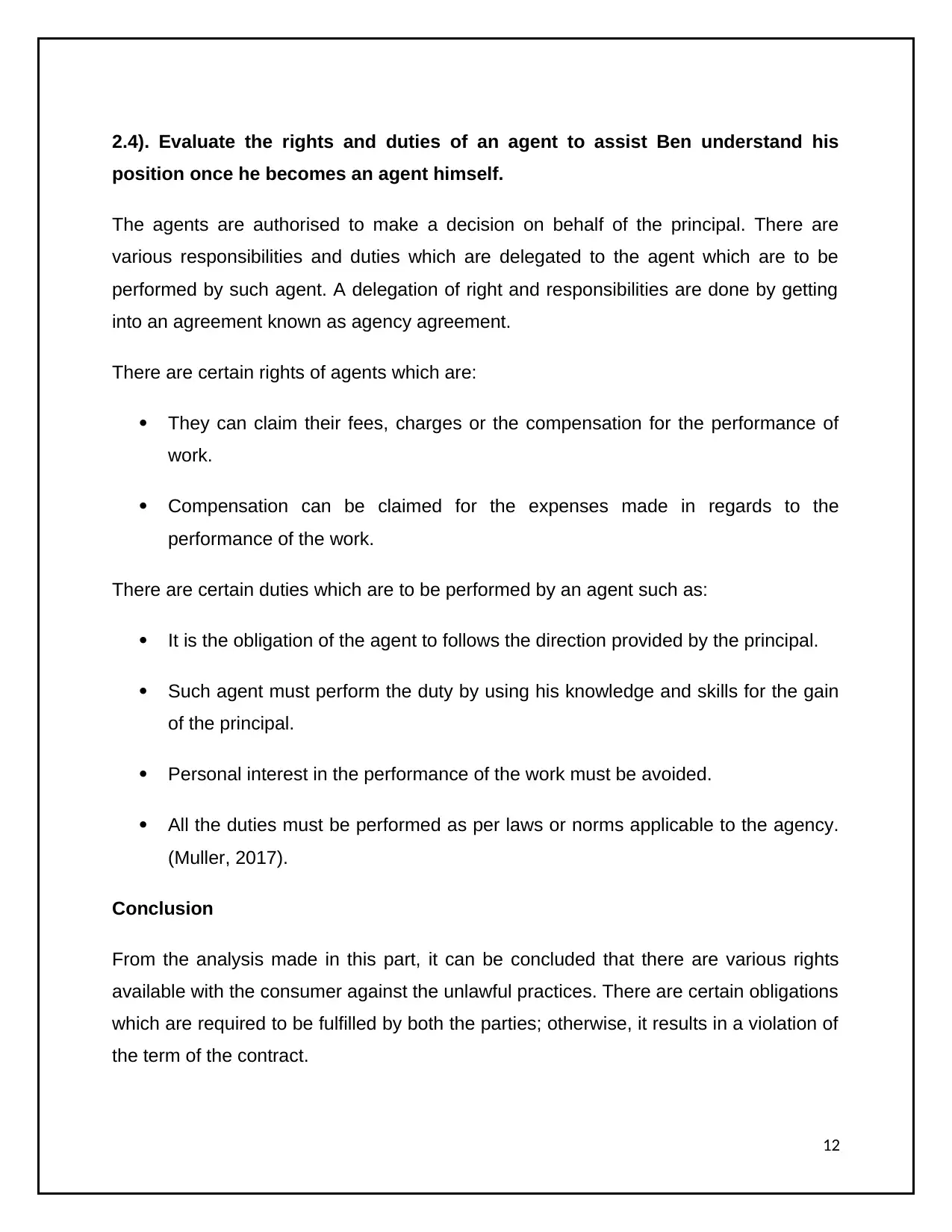
2.4). Evaluate the rights and duties of an agent to assist Ben understand his
position once he becomes an agent himself.
The agents are authorised to make a decision on behalf of the principal. There are
various responsibilities and duties which are delegated to the agent which are to be
performed by such agent. A delegation of right and responsibilities are done by getting
into an agreement known as agency agreement.
There are certain rights of agents which are:
They can claim their fees, charges or the compensation for the performance of
work.
Compensation can be claimed for the expenses made in regards to the
performance of the work.
There are certain duties which are to be performed by an agent such as:
It is the obligation of the agent to follows the direction provided by the principal.
Such agent must perform the duty by using his knowledge and skills for the gain
of the principal.
Personal interest in the performance of the work must be avoided.
All the duties must be performed as per laws or norms applicable to the agency.
(Muller, 2017).
Conclusion
From the analysis made in this part, it can be concluded that there are various rights
available with the consumer against the unlawful practices. There are certain obligations
which are required to be fulfilled by both the parties; otherwise, it results in a violation of
the term of the contract.
12
position once he becomes an agent himself.
The agents are authorised to make a decision on behalf of the principal. There are
various responsibilities and duties which are delegated to the agent which are to be
performed by such agent. A delegation of right and responsibilities are done by getting
into an agreement known as agency agreement.
There are certain rights of agents which are:
They can claim their fees, charges or the compensation for the performance of
work.
Compensation can be claimed for the expenses made in regards to the
performance of the work.
There are certain duties which are to be performed by an agent such as:
It is the obligation of the agent to follows the direction provided by the principal.
Such agent must perform the duty by using his knowledge and skills for the gain
of the principal.
Personal interest in the performance of the work must be avoided.
All the duties must be performed as per laws or norms applicable to the agency.
(Muller, 2017).
Conclusion
From the analysis made in this part, it can be concluded that there are various rights
available with the consumer against the unlawful practices. There are certain obligations
which are required to be fulfilled by both the parties; otherwise, it results in a violation of
the term of the contract.
12
⊘ This is a preview!⊘
Do you want full access?
Subscribe today to unlock all pages.

Trusted by 1+ million students worldwide
1 out of 27
Related Documents
Your All-in-One AI-Powered Toolkit for Academic Success.
+13062052269
info@desklib.com
Available 24*7 on WhatsApp / Email
![[object Object]](/_next/static/media/star-bottom.7253800d.svg)
Unlock your academic potential
Copyright © 2020–2025 A2Z Services. All Rights Reserved. Developed and managed by ZUCOL.





